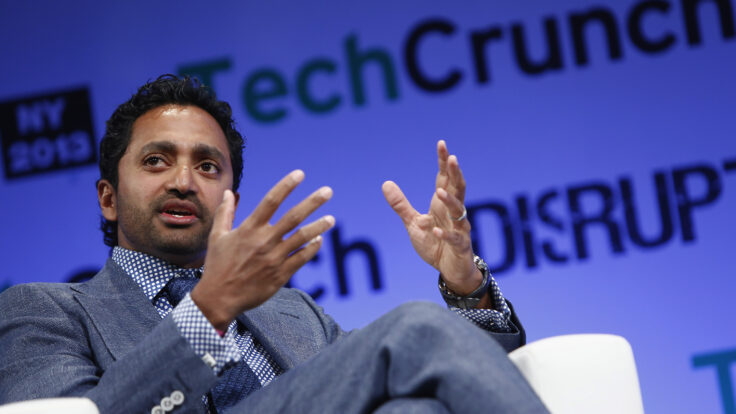 |
 |
|
Welcome back to The Best & The Brightest, I’m Tara Palmeri. It’s been a wild week on Capitol Hill; despite so much tragedy in Israel, there’s still a speaker fiasco to deal with here in town, and my partner Abby Livingston has the inside story of the latest machinations. Meanwhile, my reporting tonight explores a 2024 campaign phenomenon that is constantly whispered about but barely reported: the surprising professionalization of the Trump political operation, and whether it can hold if he returns to the White House.
Before we get started, a quick note from the Democratic non-campaign trail…
- Will Dean Phillips pull the trigger?: The clock’s ticking for any Biden primary challenger to get on the ballot in all 50 states, as I wrote last Thursday, but Democratic Rep. Dean Phillips has been telling colleagues that he’s seriously considering a run, and will make a decision in the coming days. Phillips, a relative unknown with substantial personal resources—he’s heir to a Minnesota distilling fortune—has already given a slew of interviews and resigned from the House’s Communications Committee. (Primarying your party’s leader is obviously off-message.) “As for 2024, the volume of encouragement is growing rapidly, but I have not made a decision,” Phillips told me, brushing off my question about whether he’s working to get on the ballot in Nevada. (The deadline is Sunday.)
It’s hard to see Phillips having much of an impact, obviously, let alone triggering other would-be Democratic candidates—Pritzker, Newsom, Whitmer, etcetera—to step off the bench. Unlike Marianne Williamson, however, Phillips is an elected Democratic official, which could be a boon to Republicans searching for a talking point. “He provides an illusory option for people who want to believe that there’s someone other than Biden,” said the Lincoln Project’s Reed Galen. “And it gives Biden’s opponents the option to say even Democrats don’t want Biden.”
|
| And now a word from Abby Livingston on Capitol Hill… |
| Scalise’s Collapse & Menendez’s New Charge |
|
Nine days after Kevin McCarthy’s ouster, the House remains ungovernable: Steve Scalise, the man chosen by Republicans to be their speaker, withdrew his bid tonight after it became clear he did not have enough support for a floor vote. And so, the House lurches on in anarchy. Meanwhile, one opportunity arising from the power vacuum is the empowerment of House Republican chairs—particularly on foreign policy.
- “Playing with fire”: Speakers traditionally consolidate their power at the expense of committee chairs. But without a party leader, the current chairs have more freedom—and the ones dealing with national security are taking initiative to demonstrate a united, bipartisan front as Israel goes to war to defend it itself.
On Wednesday, the top two members of the House Intelligence Committee—Chairman Mike Turner and ranking member Jim Himes—appeared together in a conciliatory CNN interview. Over at House Armed Services, Mike Rogers and Adam Smith issued a joint statement on the Hamas attack. But none seem to be stepping into the leadership vacuum quite like Michael McCaul of the House Foreign Affairs Committee.
A solid interventionist on foreign policy, McCaul is still steamed about the Afghanistan withdrawal, and remains Ukraine’s best friend in the House G.O.P. conference. He recently joined with the committee’s top Democrat, Gregory Meeks, to sponsor a resolution supporting Israel. Their relationship goes back at least eight years, when McCaul pointed to Meeks as an example of his bipartisan friendships in an interview with me.
Now, however, McCaul is going much farther. In comments to reporters after speaking at a conference meeting, he’s showing signs of embracing his inner Jerry Maguire: “I made the conference aware that we’re living in a dangerous world. The world’s on fire. Our adversaries are watching what we do, and that, quite frankly, they like it.” He continued: “I see a lot of threats out there. One of the biggest threats I see is in that room… It’s very dangerous what we’re doing, and I just wanted them to know that… we’re playing with fire.”
- Squad tensions: Meanwhile, the public back-and-forth between House Democratic members over the war in Israel is more than just performative politics. I’m hearing that the crisis is just as hot in private discussions, and that the issue “is dividing the hard left from the rest,” as a source in touch with caucus members characterized tensions to me.
In the last day or so, Democrats I’ve spoken with seem to be more focused on Israel than the G.O.P. speakers’ race, and there’s still very much a sense that “this is their problem.” Loyalty behind Hakeem Jeffries also seems to be consolidating across the caucus with each passing day that the House Republican leadership crisis carries on.
- Secret agent man: Federal prosecutors served up another allegation against Robert Menendez on Thursday: that he covertly worked as a foreign agent on behalf of Egypt while serving as the chairman of the Senate Foreign Relations Committee. Thursday’s revelation is yet another example of why Democrats are not treating these allegations as routine New Jersey corruption. The idea that Egyptian leaders appear to have believed they held sway over the chairman of the Senate Foreign Relations Committee, in the view of some Senate Democratic circles, is a potential national security issue.
In a rich bit of timing, the committee—from which Menendez has stepped down as chairman but is still a member—will hold a batch of nomination hearings next Thursday, including on Herro Mustafa Garg, who’s on track to serve as the American ambassador to Egypt.
|
 |
| The Trump Eras Tour |
| Political rivals and media critics have been caught off guard by the unexpected professionalism and discipline of the 2024 Trump campaign, led by the triumvirate of Wiles, Miller, and LaCivita. They’ve cut costs and stripped organizational layers with a singular purpose: supporting the principal, no matter what. So, will it last? |
|
|
|
| Perhaps the defining feature of Trump’s 2016 campaign, and certainly the pre-Covid years of his presidency, was that he’d amassed a decidedly anti-Goodwinian team of rivals: various members of his inner circle all hated one another, leaked their grievances to the press, and ratted out their enemies to enterprising reporters around town. After the buttoned-up Obama years, Washington journalists were suddenly flooded by epic tales of backstabbing and political interventions and palace intrigues: Steve Bannon fighting Reince Priebus; the machinations of Ivanka and Jared; the shocking Oval Office clashes between the president and the dozens of top officials he hired and fired, often in humiliating fashion, and so forth.
The daily IV drip from panicked West Wing insiders produced unprecedented volumes of adrenaline-spiking headlines, turning plugged-in reporters like Maggie Haberman, Jonathan Swan and Kaitlan Collins into veritable media celebrities and household names. And it turned cabinet secretaries and senior officials into stars recognizable by their first names only, like fashion designers or pop stars: Dina, Kellyanne, The Mooch.
But something strange has happened in the 11 months since Trump announced his second presidential bid: The scoopy, personality-driven stories have all but ceased. Trump, of course, was often the source of his own leaks, calling his vast network of friends to gauge ideas or vent, before those pals quickly called their favorite reporter. But I’m told that Trump, too, has been more guarded after feeling burned by associates, especially in his many court cases.
If there is any dysfunction within the Trump campaign, it’s remained largely private. Whether it’s the addition of veteran operatives or the departure of self-serving egomaniacs, the Trump ’24 operation has not only professionalized but also hermetically sealed itself off from unwanted leaks, at least for now. “It’s a lot harder to do our job,” said one campaign reporter. “Trump people don’t all hate each other. They’re not stabbing each other in the back, talking shit about each other on background.”
Sure, there’s lingering drama around Trump’s legal team, which has struggled with high turnover and occasional infighting over strategy. And yes, Trump is still saying and posting every terrifyingly offensive or comically absurd thought in his head: comparing his body to Joe Biden’s, calling Hezbollah “very smart,” attacking migrants for “poisoning the blood of our country,” the weird diatribes about bathroom water pressure… none of which Republicans bother to respond to anymore. These days, the mainstream coverage of the former president oscillates between exhaustion and outrage, following his four indictments and 91 felony charges, including for attempting to overturn the 2020 election.
But when it comes to the mechanics of the Republican primary campaign, which Trump is leading by almost 50 points, his team has demonstrated a remarkable ability not to get in his way. Instead of leaks, there have been strategic handouts to the New York Times, like the campaign’s fundraising numbers or Trump’s plans to serenade auto workers. The Trump campaign has been aggressively cultivating state powerbrokers—sometimes wining and dining them at Mar-a-Lago—to choke off support for Ron DeSantis in Iowa and New Hampshire.
Perhaps most notably, however, the campaign has been engaged in what Seema Mehta at the L.A. Times recently called a “strategic, surgical” effort to overhaul obscure state party rules to twist the delegate system in Trump’s favor by making the process more winner-takes-all. The former George W. Bush attorney Ben Ginsberg actually credited the campaign with being the only one that “went out and did the really hard grunt work of talking to state parties to try and get them to meld their rules to Donald Trump’s favor.” There’s also been a push by his team to change state primaries into caucuses, which tend to favor candidates with the most grassroots support. Thoughtful strategy had never been a hallmark of the wild and slapdash Trump operation. Now it is.
And while Trump has made a splash by mobilizing on news events, like going to East Palestine or beating Biden to Detroit, his team is also focused on the unsexy details, like mail-in ballots and early voting. They’ve built up substantial county-level operations, and focused early on winning over the Florida delegation, robbing DeSantis of his natural allies. Even if they’ve struggled to secure big name donors, the campaign has figured out how to leverage Trump’s indictments to supercharge fundraising. They’re even saving money by holding fewer rallies—about two per month—and leaning on policy videos, messaging events and tele-rallies, instead.
The operational glow-up has not gone unnoticed. “It’s amazing how they’re running laps around everyone,” said an aide for a rival campaign, admiring how Trump’s team announced that he was a target of Jack Smith’s Jan. 6 case shortly before DeSantis recorded his first big interview with Jake Tapper.
|
|
A MESSAGE FROM META
|
| |
 |
| The future of training is happening today, in the metaverse.
Thanks to a VR training tool created by ForgeFX, students across the country can gain virtual hands-on experience from the Tulsa Welding School—which means more aspiring welders can access quality training and more jobs can be filled by skilled workers.
Explore the impact.
|
|
|
|
|
| Perhaps this late-stage discipline shouldn’t be a total surprise for a candidate on his third presidential campaign—and particularly one who may be motivated into service to avoid incarceration. Trump is no longer the underdog, sure, but he’s also simply burned through the various hangers-on who plagued his first made-for-TMZ campaign—small ball players with a chip on their shoulder like Corey Lewandowski, or the international mercenary Paul Manafort, who ran the campaign before Kushner took over. Big egos like Bannon were constantly getting in trouble for trying to control policy and access to Trump. Others tried to steer his decisions through appearances on Fox News. This time around, official Trump surrogates are barely on TV at all. They may have learned that, despite Trump’s adoration of traditional media, much of their base is reachable through different channels.
Trump’s re-election manifested problems of a different magnitude: Whereas in 2016 the historically stingy Trump spent $50 million of his own money and got cranky and abusive with the staff whenever it was spent, the 2020 campaign—which Brad Parscale called the “Death Star”—was infamously wasteful, even though Covid limited retail political opportunities. There was a building full of staffers in Arlington, and high-cost rallies virtually every week. Parscale, whose personal issues sometimes overshadowed the campaign, ending up spending $1.6 billion in total.
This time, Trump’s team is small, with a senior staff of eleven people and about 15 assistants. The top cohort of veteran campaign operatives, or “real people” as they’re often described to me, are top advisers Jason Miller, Chris LaCivita, and one-time DeSantis operative Susie Wiles, with LaCivita and Wiles essentially sharing the campaign manager role in all but name. Perhaps this triumvirate knows that the fastest way to meet your doom in Trumpworld is to crave that title, which is why nobody has explicitly claimed the mantle, but instead have opted to divide responsibilities.
Others in Trump’s inner circle include delegate operatives Brian Jack and James Blair; lawyer Dave Warrington; policy guru Ross Worthington; spokesperson Steven Cheung; speechwriter Vince Haley; pollster John McLaughlin; and ad guy John Brabender—none of them are famous, or appear to want to be, like their predecessors. And none appear to want to annihilate each other yet, too. (Jared, Ivanka, Bannon, and Lewandowski, notably, are nowhere to be seen.) “Reporters go nuts that the team isn’t internally knifing each other and turning on each other,” said one senior Trump advisor. “Susie has built a very ‘no jerks’ team.”
Indeed, almost every Trump campaign veteran I’ve spoken to has credited Wiles with the stability. She has a knack for managing details, they say, without stepping on toes, and has capably survived atop the campaign hierarchy since joining the team in January 2021, the longest of anyone in Trump world. “I’m a fan of this campaign. As opposed to 2020, he’s running a highly professional operation with fewer egos,” Kellyanne Conway, Trump’s 2016 campaign manager, told me. “Don’t be fooled by Susie Wiles, the docile, charming blue-eyed grandmother, who never makes herself the story. She was unfairly treated by the DeSantises and knows the pressure points.”
Another former campaign official attributed Trump’s success to the fact that the people working for him have a better understanding of how to harness his energies and anxieties. Back in 2017, I reported for Politico that the president’s aides and advisers would soothe Trump by feeding him a steady diet of positive news in order to keep him calm and away from Twitter—a tactic that Miller deployed during the first campaign. Axios recently reported that they’re still doing this, though perhaps with a lighter, softer touch.
Of course, it’s easier to steer a small ship during the primary, when Trump is dominating the field and practically a shoe-in for the G.O.P. nomination. Their no-drama campaign will be tested as it scales in advance of a general election. Currently, the plan is to hire more people at the state level, with whatever money is left over after Trump’s legal fees, while keeping the brain trust intact. I’m told that the triumvirate don’t plan to add any more high-level staffers to his inner circle. “It’s our intention to stay lean,” said a senior advisor.
|
|
|
|
|
| Would the comparative professionalism of the Trump campaign extend to a second tenure in the White House? It’s worth recalling that so many of the leaks during those years were facilitated by motivated and frustrated White House insiders who were desperate to curb or preempt the president’s worst instincts, like firing the Attorney General or the Special Counsel (or leaving NATO… or invading Venezuela). Other times, leaks were a weapon to advance various policy agendas or knife enemies.
When I was a White House correspondent for Politico, I had a daily diet of leaks, which helped catapult me to a job as a White House correspondent at ABC News. I knew the factions in the White House and who to call to confirm, often without having to bother with a press secretary. In fact, I remember seeing the markets crash in real time when I reported that there was an executive order drafted to remove the U.S. from NAFTA with no immediate new trade deal to replace it.
Back then, it was all too easy: There was a gang of rivals around Trump who fought for power in the White House, and used the media to do it. The constant kneecapping also worked to Trump’s advantage, in some ways at least, since it limited the ability of anyone to rise too high. Even Secretary of State Rex Tillerson, the former Exxon C.E.O., was brought low when it was leaked that he had been informed of his sacking while on the toilet in Africa, sick with food poisoning. For a time, especially in those early years, every other day was like that.
Would a second Trump term emulate his first administration or his third campaign? Could the new custodians running the adult day care facility prevent him from using his infamous “executive time” to lavish vendettas on his enemies, gut the federal government, or upend the international order? It may all come down to whether Wiles, LaCivita and Miller choose to enter the White House rather than monetize their proximity on K Street.
If he does make it back to the White House, I expect that the Republicans who privately bitch and whine about him will still go work for him—because what spineless no-name Republican wouldn’t take a job in the administration? But will they also leak to save the free world? I’ll let you know what they tell me next week.
|
|
|
|
| FOUR STORIES WE’RE TALKING ABOUT |
 |
|
 |
| War & Scalise |
| How long can the House G.O.P. chaos last? |
| TINA NGUYEN |
|
 |
|
 |
|
|
|

|
 |
|
|
|
Need help? Review our FAQs
page or contact
us for assistance. For brand partnerships, email ads@puck.news.
|
|
You received this email because you signed up to receive emails from Puck, or as part of your Puck account associated with . To stop receiving this newsletter and/or manage all your email preferences, click here.
|
|
Puck is published by Heat Media LLC. 227 W 17th St New York, NY 10011.
|
|
|
|



















